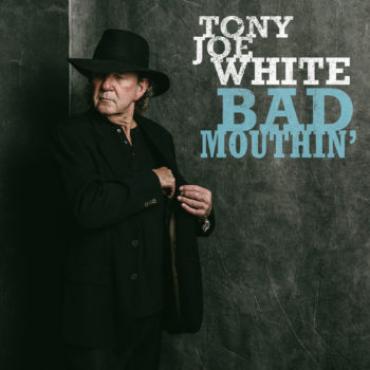Tony Joe White’s Bad Mouthin’ Blues

If you’re looking for a swamp thing, Tony Joe White is your go-to man. For the last 50 years, White has been thrashing around in the muck, regaling us with tales of swamp denizens he has been acquainted with. 1968’s “Polk Salad Annie” introduced the world to a “wretched, spiteful,straight-razor totin’ woman” who lived in backwater Louisiana, where the alligators grow so mean. White’s sepulchral narrative, inspired by Bobbie Gentry’s 1967 hit, “Ode To Billie Joe,” was as gritty as the subject matter, but his down home, tongue-in-cheek humor and the “chomp chomp” chorus elevated it to cult status, fodder fit for a King. Elvis adopted it around 1972 , and made it a staple of his live shows. He also recorded another of White’s songs, “I Got A Thing About You Baby,” on Good Times in 1974.
On White’s debut, Black and White, with “Willie And Laura Mae Jones” he demonstrated that his mucky narratives weren’t novelty songs, that he was writing what he knew from experience, with lyrics like “the people worked the land together, and we learned to count on each other / When you live off the land you don’t have the time to think about another man’s color.”
His follow up, 1969’s …Continued, unleashed “Rainy Night In Georgia,” a big hit for Brook Benton that overshadowed another of White’s good ole boy narratives from the album, “Roosevelt and Ira Lee,” about a couple of swamp dwellers out for a night of bullfrog huntin’ until Ira Lee steps on a water moccasin and the two decide that stealing chickens is a safer option. White went on to worldwide acclaim and coverage by artists from Eric Clapton (“Did Somebody Make a Fool Out Of You”) to Willie Nelson (“Problem Child”) and Tina Turner and Kenny Chesney (“Steamy Windows.”)
For his latest, White goes back to his blues roots, honoring Lightnin’ Hopkins, Jimmy Reed, and Charley Patton. “My favorite during those days when I was a teenager was Lightnin’ Hopkins,” White says. “I actually got to play on his album L.A Mudslide, played a little guitar and harmonica on it and wrote the liner notes. So it was like getting to meet your heroes.”
Produced by son Jody, and recorded in a horse stall at his barn outside Nashville, Bad Mouthin’ is a stripped-down vehicle featuring White’s gloriously weathered vocals aided by his ’65 Fender strat and drummer Bryan Owings and bassist Steve Forrest helping out on some cuts. But mostly it’s just the man and his guitar, and that’s enough.
The title cut is an original that sounds like it came from a John Lee Hooker fever dream about a trash-talking woman who’s gonna get retired from the relationship if she doesn’t cease and desist.
Big Joe Williams popularized “Baby Please Don’t Go” in 1935, but Muddy’s 1953 take with Little Walter on harp set the bar pretty high. White’s cover, accompanied by his guitar and patting foot punctuated by some intermittent harp licks, is low down and wiggly, a whispered plea pitched at a frequency aimed at that things that walk upright in the daylight but slither and crawl in your nightmares.
Reed’s “Big Boss Man” gets the same solo guitar foot pattin’/harp setup, White’s whispered delivery adding an additional patina of pain to the protest song downsizing the big overseer.
Backed on brushes by Owings, who is White’s frequent tour percussionist, “Sundown Blues” is a White original from 1966. Inspired by John Lee Hooker, it glides smoothly through the underbrush and Polk salad bushes, White trying to shake off the ailment that hits about the time the sun disappears for the day.
White was built for this stuff, his breathless, whispery vocals as effective in delivering his message as the big blues shouters.
But his coverage of Elvis’ “Heartbreak Hotel” is a makeover that makes all the swamp critters sit up and take notice. Sounding like he’s fallen in a vat of Thorazine, with just an acoustic guitar to support him while he circles the drain. White moans like a reanimated corpse in search of a soul. Its creepy, eerie, and wonderful.
The 75-year-old White has aged well, sound-wise. He’s still as crusty and scruffy as ever. That might be faint praise in some circles, but in these swampy environs, it’s a badge of honor he still wears proudly.




